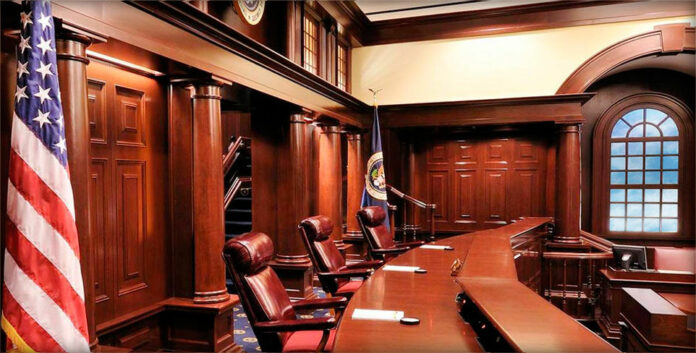The legal of issue of whether and under what circumstances a taxpayer or citizen can bring a lawsuit against a government agency was argued in court this week.
On Tuesday, three justices for the California Sixth Appellate District court heard oral arguments in the cases, Holloway v. Edwidge and Gregory Dildine and the San Lorenzo Valley Water District and Holloway v. Showcase Realty Agents, Inc. For the purposes of briefing and argument the court heard both cases together.
The cases are on appeal from decisions issued in 2016 by the Superior Court of Santa Cruz County, which dismissed Holloway’s lawsuits on the grounds that Holloway did not have “standing.”
Holloway’s lawsuits challenge the legality of the contract between SLVWD and the Dildines, signed in 2010, for the purchase of property by the District and brokered by a real estate agency in which Terry Vierra, then serving on the SLVWD Board, allegedly had an improper interest.
Representing Bruce Holloway, the plaintiff and appellant in both cases, was Scotts Valley attorney Gary Redenbacher. Michael Colantuono was the attorney representing the SLVWD and Shannon Jones represented Showcase Realty Agents.
The issue of “standing” is a legal test courts use to determine whether a person has a right to file a lawsuit and have a court consider and decide the merits of his or her claim that a law has been violated. Without “standing” the courts will dismiss a plaintiff’s suit and not reach the merits, even though a dismissal because of a lack of standing, as a practical matter, can be the same as deciding not to rule on the underlying violation.
“The citizenry should be allowed to take government officials to court for illegal actions,” said Redenbacher in his opening argument Tuesday. “Standing is important for taxpayers to have this route of action.”
Longstanding California statutes and cases have expanded the concept of “standing”, conferring “standing” on the general public, acting as taxpayers or citizens, to allow them to bring litigation to address alleged violations of the law by government agencies in many circumstances.
According to Redenbacher, Holloway met the requirements for “standing” in a taxpayer or citizen suit and the trial court should have moved on to decide the merits of the lawsuit regarding the illegal nature of the contract. The SLVWD and the other defendants argued that the trial court’s decision was correct and the appeals court should uphold the trial court and affirm the dismissals of the lawsuits.
“A private citizen should not be allowed to hire a private lawyer with his or her own interests to take this kind of case. It is something the district attorney should take on,” said Colantuono addressing the justices on behalf of the SLVWD. “The court should not close its eyes away from due process.”
According to Jones arguing on behalf of the real estate agency, “What (Terry) Vierra did was not collusion or fraud.”
A 2015 San Bernardino County case decided by the Fourth Appellate District found that standing to “avoid” a public agency contract only extended to those persons who were parties to the contract, but not involved in the fraud, and citizen or taxpayer standing didn’t apply if the action complained of was a “discretionary” one of the government agency.
Per SLVWD, there is no conflict in the multiple appellate district court decisions addressing similar subject matter and cited by the parties — therefore the Santa Cruz Superior court was duty bound to follow the Fourth Appellate District court (which is not the case under California law if there are truly conflicting decisions from the different appellate courts).
Presiding Justice Franklin Elia stated during arguments Tuesday, “The contract is void if I have an interest and I am married to the person selling property—a taxpayer has the standing to go after you.”
Comments made by judges during oral argument are not the court’s ruling, but can be an indication of which way a court is leaning.
The Superior court in its 2016 decisions dismissing the lawsuits on grounds of standing did not decide the merits regarding whether the 2010 contract between the SLVWD and the Dildines was illegal. The trial court had concluded that the SLVWD’s actions were “discretionary” in nature and that Holloway was not a party to the contract, which, according to the trial court, takes the contract outside the reach of a taxpayer or citizen suit. Holloway appealed the trial court’s order of dismissal to the Sixth Appellate District Court in mid-2016.
The justices will announce their ruling on the two cases within 90 days.













